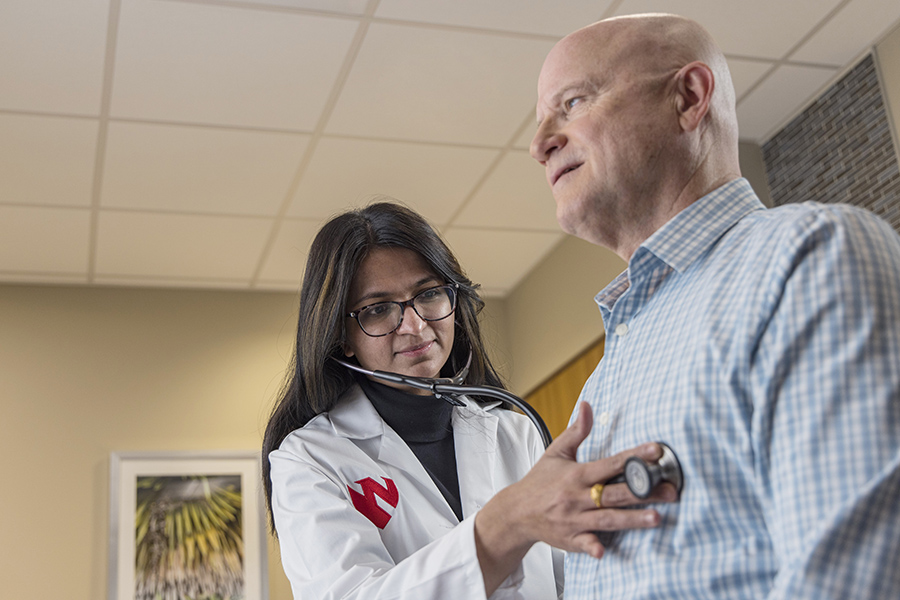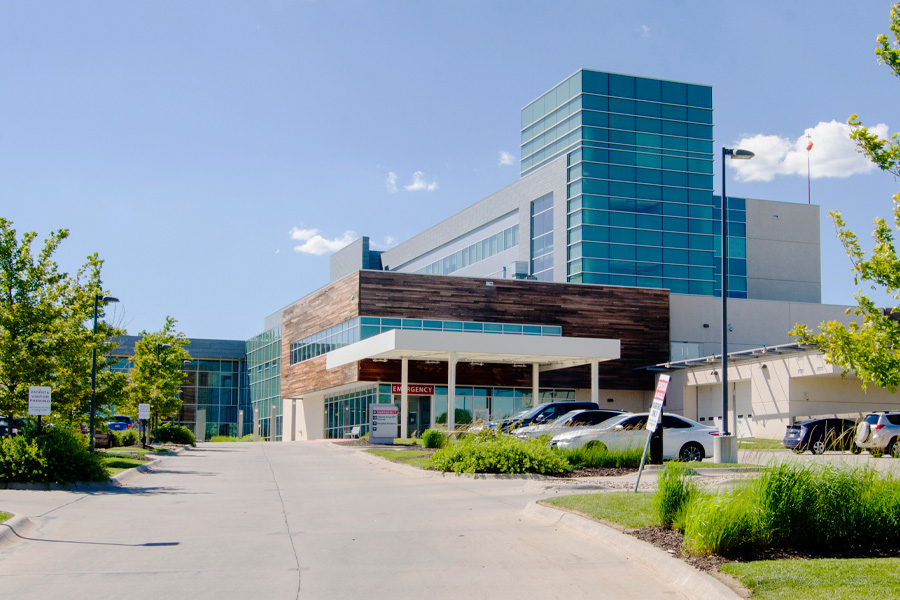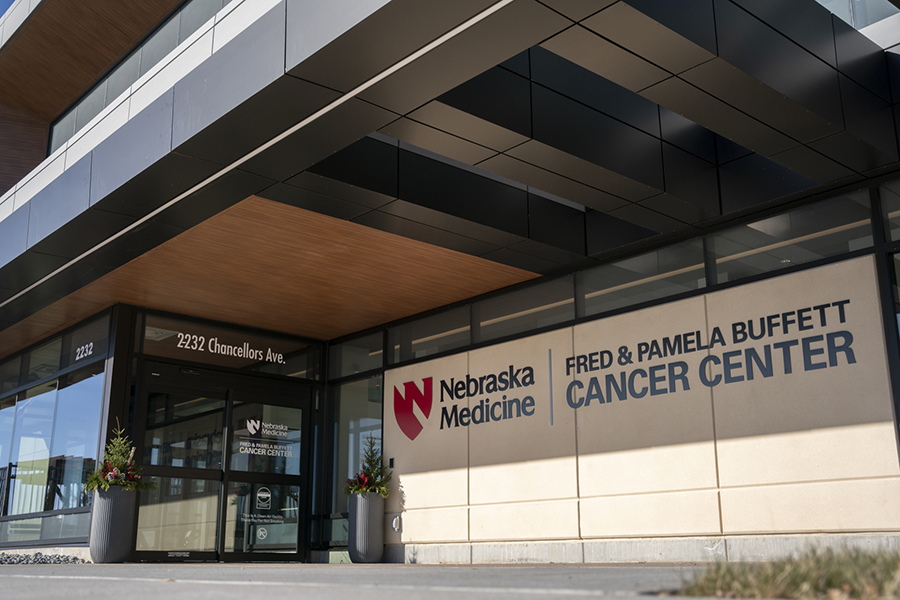Benign hematology focuses on non-cancerous blood disorders that affect blood cells, bone marrow and clotting. These conditions, like anemia, bleeding and clotting disorders (such as hemophilia and thrombophilia), and sickle cell disease, are not cancer but can still impact health. Specialists in benign hematology diagnose and treat these disorders to help manage symptoms, prevent complications, and improve quality of life. UNMC researchers are actively studying new therapies and advanced treatment approaches to improve outcomes for patients with these conditions. With advancements in research and personalized care, many people with these disorders can lead healthy, active lives.
Breast cancer is one of the most common cancers affecting women worldwide, though it can also occur in men. This type of cancer develops in the cells of the breasts, often forming a lump or mass. The causes of breast cancer can include genetic mutations, hormonal factors, and lifestyle influences. Treatment options vary depending on the type and stage of the cancer and may involve surgery, radiation therapy, chemotherapy, hormone therapy or targeted therapies. Early detection through regular screenings and prompt treatment are crucial for improving outcomes and enhancing the quality of life for individuals affected by breast cancer. Our researchers and their partners at other institutions are actively engaged in developing advanced treatments and improving patient care for breast cancer, with numerous clinical trials currently open to participants.
Hematological Malignancies
Hematological malignancies are cancers that affect the blood, bone marrow and lymphatic system. These include leukemia, lymphoma and multiple myeloma, which can interfere with the body's ability to produce healthy blood cells and fight infections. Our specialists and our clinical partners at Nebraska Medicine use advanced treatments like chemotherapy, immunotherapy, targeted therapies and bone marrow transplants to provide personalized care. Ongoing research at UNMC is focused on developing new, more effective treatments to improve outcomes and quality of life for patients with these complex diseases.
Acute Lymphocytic Leukemia
Acute Lymphocytic Leukemia is a fast-growing cancer of the blood and bone marrow that affects white blood cells called lymphocytes. It develops when abnormal lymphocytes multiply uncontrollably, crowding out healthy blood cells and making it harder for the body to fight infections. ALL is the most common type of childhood leukemia but can also occur in adults. Symptoms may include fatigue, frequent infections, easy bruising or bleeding, and bone pain. Treatment often involves chemotherapy, targeted therapy, immunotherapy or bone marrow transplants. At Nebraska Medicine and UNMC, specialists provide cutting-edge treatments and participate in research to improve outcomes for patients with ALL.
Acute Myeloid Leukemia is a fast-growing cancer of the blood and bone marrow that affects myeloid cells, which normally develop into red blood cells, white blood cells and platelets. In AML, abnormal cells multiply rapidly, crowding out healthy blood cells and leading to symptoms like fatigue, frequent infections, easy bruising or bleeding, and shortness of breath. AML is more common in older adults but can occur at any age. Unlike Acute Lymphocytic Leukemia, which affects lymphocytes, AML impacts myeloid cells and tends to be more common in adults rather than children. At Nebraska Medicine and UNMC, specialists offer advanced treatments, including stem cell transplants, clinical trials and targeted therapies, to provide personalized care and improve patient outcomes.
Chronic Lymphocytic Leukemia
Chronic Lymphocytic Leukemia is a type of cancer that affects the blood and bone marrow, primarily impacting older adults. It is characterized by the overproduction of abnormal white blood cells, which can crowd out healthy blood cells and impair the immune system. While CLL progresses slowly in many cases, it can vary greatly from person to person. Treatment options range from watchful waiting to targeted therapies and chemotherapy, depending on the stage and severity of the disease. Ongoing research at UNMC is focused on developing innovative treatments and improving patient outcomes for those living with CLL. Early diagnosis and regular monitoring are crucial for managing CLL effectively and improving quality of life.
Multiple Myeloma is a type of blood cancer that affects plasma cells, which are a crucial part of the immune system. This disease leads to the accumulation of abnormal plasma cells in the bone marrow, interfering with the production of normal blood cells. Multiple Myeloma can cause various complications, including bone pain, anemia and kidney dysfunction. Treatment options typically include targeted therapies, chemotherapy, and stem cell transplants, tailored to the individual’s condition and disease progression. Our research is dedicated to discovering new treatments and improving the prognosis for patients with Multiple Myeloma. Early detection and continuous monitoring are essential for managing the disease and enhancing the quality of life for those affected.
Lymphoma is a type of cancer that starts in the lymphatic system, which is an important part of the body’s immune system. It involves the abnormal growth of lymphocytes, a type of white blood cell that helps fight infections. There are two main types of lymphoma: Hodgkin lymphoma, which is identified by the presence of Reed-Sternberg cells, and non-Hodgkin lymphoma, which includes a variety of other lymphatic cancer.
Mantle Cell Lymphoma is an aggressive type of B-cell lymphoma characterized by the overexpression of cyclin D1 due to a specific genetic translocation. This cancer often presents with a wide range of clinical behaviors, making it challenging to treat with a one-size-fits-all approach. At UNMC, we participate in significant research efforts through the North American Mantle Cell Lymphoma Project (NAMCLP). This collaborative network, involving 23 institutions across North America, aims to enhance the clinical management of MCL by leveraging a comprehensive dataset of nearly 700 documented cases. Key research areas include developing upgraded prognostic models, genetic characterization and identifying biomarkers associated with therapy responses. Early diagnosis and continuous monitoring remain crucial for managing MCL effectively and improving the quality of life for those affected.
Myeloproliferative Neoplasms
Myeloproliferative Neoplasms are a group of blood cancers that cause an overproduction of blood cells in the bone marrow. These disorders can lead to various health issues, including blood clotting problems, anemia and an increased risk of bleeding. MPNs encompass several conditions, such as polycythemia vera, essential thrombocythemia and myelofibrosis, each with its own unique characteristics and challenges.
Gastrointestinal (GI) cancers encompass a group of cancers that affect the digestive system, including the esophagus, stomach, liver, pancreas, gallbladder, small intestine, colon and rectum. These cancers can disrupt the normal functioning of the digestive tract, leading to symptoms such as difficulty swallowing, abdominal pain, weight loss and changes in bowel habits. The causes of GI cancers are varied and can include genetic factors, lifestyle choices and environmental influences. Treatment options depend on the type and stage of the cancer and may involve surgery, chemotherapy, radiation therapy or targeted therapies. Early detection and prompt treatment are crucial for improving outcomes and enhancing the quality of life for individuals affected by GI cancers.
UNMC is at the forefront of research in Genitourinary (GU) cancers, striving to develop innovative treatments and improve patient outcomes. Genitourinary cancers refer to a group of cancers that affect the urinary system and the male reproductive organs. This includes cancers of the kidneys, bladder, prostate, testicles, and other parts of the urinary tract. These cancers can lead to symptoms such as blood in the urine, difficulty urinating, pelvic pain and changes in urinary habits. The causes of GU cancers can be diverse, ranging from genetic predispositions to lifestyle factors and environmental exposures. Treatment options vary depending on the type and stage of the cancer and may include surgery, radiation therapy, chemotherapy, immunotherapy, or targeted therapies. Early detection and timely treatment are essential for improving outcomes and enhancing the quality of life for individuals affected by GU cancers.
Head and Neck Cancer encompasses a variety of cancers that occur in the mouth, throat, larynx, sinuses and salivary glands. These cancers can cause symptoms such as persistent sore throat, difficulty swallowing, hoarseness and unexplained weight loss. Our researchers and their partners at other institutions are actively engaged in developing advanced treatments and improving patient care for Head and Neck Cancer. The causes of Head and Neck Cancer can include tobacco and alcohol use, human papillomavirus (HPV) infection and genetic factors. Treatment options depend on the cancer’s location and stage and may involve surgery, radiation therapy, chemotherapy, or targeted therapies. Early detection and prompt treatment are crucial for improving outcomes and enhancing the quality of life for individuals affected by Head and Neck Cancer.
Neuro oncology is a specialized medical field dedicated to diagnosing and treating brain and spinal cord tumors. It encompasses various tumor types, including gliomas, meningiomas and metastatic brain tumors. Diagnosis typically involves advanced imaging techniques and biopsies. Treatment options range from surgery and radiation therapy to chemotherapy and immunotherapy, tailored to the patient’s specific condition. The UNMC Division of Oncology and Hematology works with researchers across the university to advance research in this field and to lead to breakthroughs in patient care.
Skin cancers are among the most common types of cancer, affecting millions of people worldwide each year. Research institutions, including UNMC, are actively engaged in developing advanced treatments and improving patient care for skin cancer, with numerous clinical trials currently open to participants. These cancers develop in the skin cells and are primarily caused by excessive exposure to ultraviolet (UV) radiation from the sun or tanning beds. The main types of skin cancer include basal cell carcinoma, squamous cell carcinoma, and melanoma, with melanoma being the most aggressive form. Treatment options for skin cancer depend on the type and stage of the cancer and may involve surgical removal, radiation therapy, chemotherapy or targeted therapies. Early detection through regular skin checks and prompt treatment are crucial for improving outcomes and enhancing the quality of life for individuals affected by skin cancer.
Sarcomas are a type of cancer that starts in the bones or soft tissues, like muscles, fat and blood vessels. Institutions like UNMC are dedicated to finding better treatments and improving care for people with sarcomas, with many clinical trials currently available. Sarcomas can appear anywhere in the body and are usually divided into two main types: bone sarcomas and soft tissue sarcomas. Treatment options depend on the type, location and stage of the cancer and may include surgery, radiation therapy, chemotherapy or targeted therapies. Catching sarcomas early and starting treatment quickly are key to better outcomes and improving the quality of life for those affected.
Thoracic oncology is a specialized field of medicine focused on the diagnosis and treatment of cancers that occur in the chest area, including the lungs, esophagus and other thoracic organs. This branch of oncology addresses various types of thoracic cancers, such as lung cancer, mesothelioma and thymoma. Treatment options in thoracic oncology often involve a multidisciplinary approach, including surgery, radiation therapy, chemotherapy, and targeted therapies. UNMC is dedicated to advancing treatments and enhancing patient care for thoracic cancers, with many clinical trials currently available. Early detection and prompt treatment are crucial for improving outcomes and enhancing the quality of life for individuals affected by thoracic cancers.
Some examples of thoracic cancers include:
- Lung Cancer: The most common type of thoracic cancer, which can be further classified into non-small cell lung cancer (NSCLC) and small cell lung cancer (SCLC).
- Mesothelioma: A rare cancer that affects the lining of the lungs (pleura) and is often linked to asbestos exposure.
- Esophageal Cancer: Cancer that occurs in the esophagus, the tube that carries food from the throat to the stomach.






